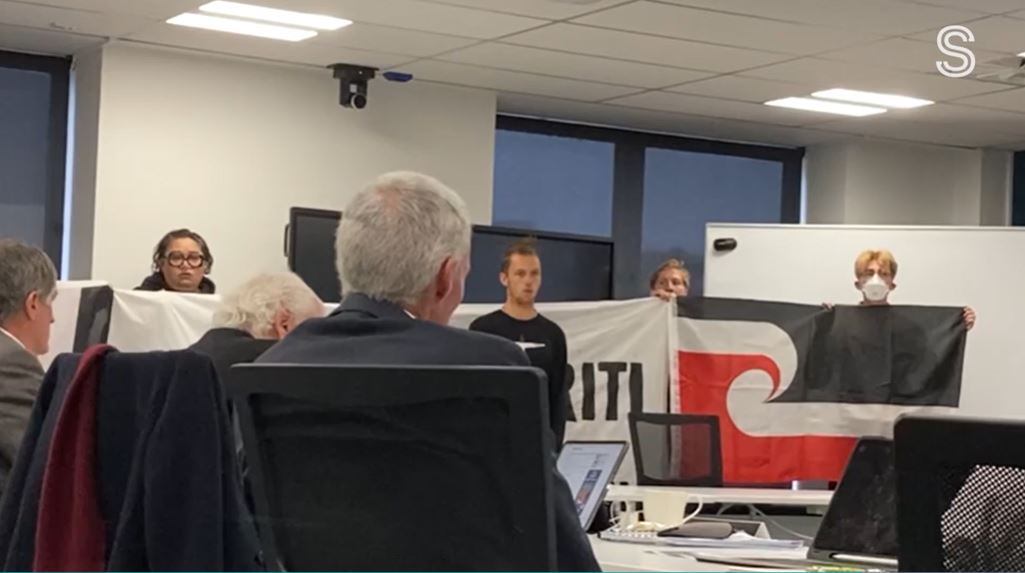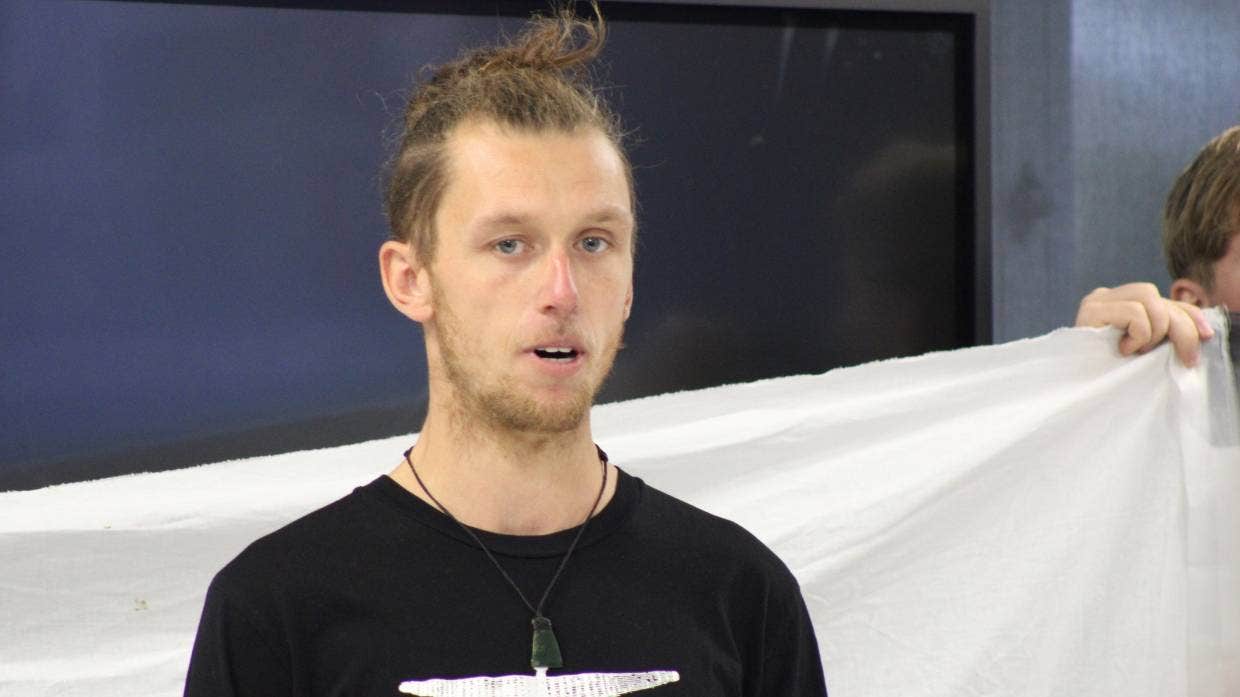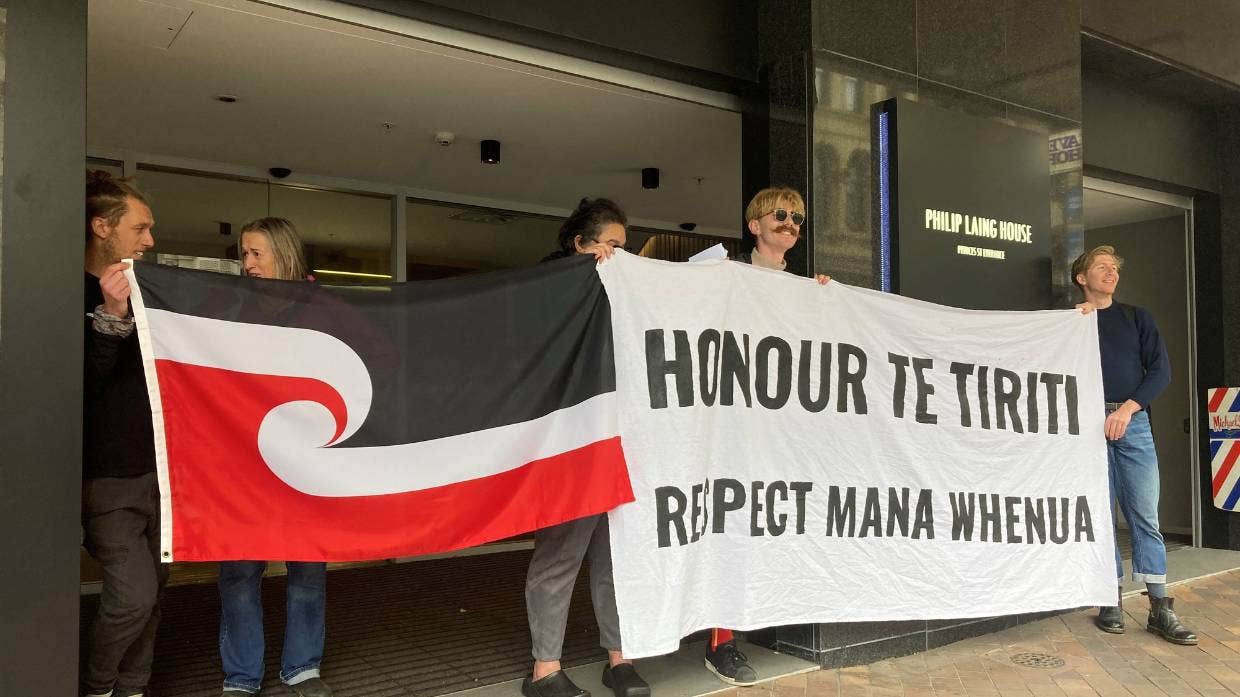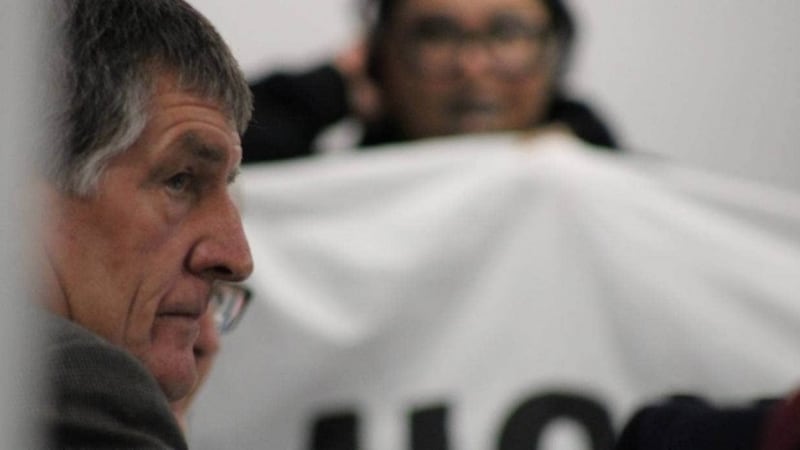Otago Regional Council councillor Kevin Malcolm looks on as Sina Davis holds a protest sign. Hamish McNeilly / Stuff
By Hamish McNeilly, Stuff
A councillor who walked out during a karakia at a council meeting became emotional as he addressed a protestor.
Alex Gorrie (Kāi Tahu, Kāti Māmoe and Waitaha) held a large sign urging those on the Otago Regional Council (ORC) to honour Te Tiriti before addressing councillors in the public forum on Wednesday.
‘’I thought this isn’t good,’’ Gorrie said, when he read about Cr Kevin Malcolm walking out of a council meeting.
The pair exchanged emails, and Malcolm told Gorrie in the meeting that he was on a different stage of the journey, and he would like to work with him.

A meeting of the Otago Regional Council led to a protest after a councillor walked out of a previous meeting over a karakia. Hamish McNeilly / Stuff
‘’I’ve already got a full-time job,’’ Gorrie said, as applause broke out in the public gallery.
Malcolm noted the minutes of the last meeting, which stated he left after the karakia.
‘’At no stage did I disrespect the karakia,” he said.
That differed to previous comments he made to Stuff after his walk out when he said “it was just a tick box exercise to try and get favour, it was just so wrong’’.

Alex Gorrie addressed a meeting of the Otago Regional Council as part of the public forum. Hamish McNeilly / Stuff
ORC chair Gretchen Robertson, who started the meeting with a karakia, brought item six on the agenda forward – the opening and closing of council and committee meetings.
The council report noted that in Te Ao Māori (the Māori world view) karakia delineates a time and space for a specific activity/event. It clears the pathway and brings people together for a common purpose, and while it was commonly translated as a “prayer”, it did not have to have religious intent.
‘’I want everyone to have a chance to be able to say what they want to say,’’ Robertson told the meeting.
Councillors largely spoke in support, including Cr Alan Somerville, who said the use of karakia enriched meetings, and he looked forward to the time it became a regular part of them.

Protesters outside an Otago Regional Council meeting. Hamish McNeilly / Stuff
Cr Alexa Forbes said whether or not Māori were in the room, or if colleagues stumbled over the pronunciation, the use of karakia sent a signal to a bi-cultural partner that ‘’we were in this together’’.
Cr Michael Laws spoke against the use of a karakia, saying he had a fundamental objection to the use of religion or the supernatural in council affairs.
He noted the separation of church and state came from the forebears who arrived to New Zealand in the 19th century.
Asked by Cr Elliot Weir about whose forebears he was speaking of, Laws replied his own: ‘’Those that developed this country ... the reason we have an economy today.’’
Laws noted the council, which had no Māori elected members, wanted to impose a karakia.
“We are deciding to adopt the worst kind of tokenism ... the very worst kind.
“It is not simply wrong ... it is risible.”
He suggested those who did not want to be present for a karakia did not need to have it imposed upon them.
Meanwhile, Cr Malcolm said he had no issue with the use of karakia, but advocated for more training.
Councillors voted to note the report, with only Cr Laws voting against.
The suggested karakia for the Otago Regional Council:
Opening: Tuia ki runga (Unite above) Tuia ki raro (Unite below) Tuia ki waho (Unite without) Tuia ki roto (Unite within) Tuia ki te here tangata (Unite as one)
Ka rongo te po (Listen to the night) Ka rongo te ao (Listen to the world of light) Haumi e, hui e, taiki e (and now we can come together).
Closing: Kua mutu a mātou mahi (Our work is finished) Mō tēnei wā (for the moment) Manaakitia mai mātou katoa (Bless us all) O mātou hoa (Our colleagues) O mātou whānau (Our families) Aio ki te aorangi (Peace to the universe)
The karakia may be chosen by the meeting chair to open and close a meeting.

